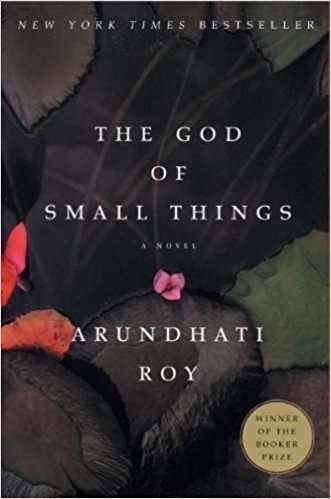Book Review: The God of Small Things by Arundhati Roy
Arundhati Roy's second novel, The Ministry of Utmost Happiness, was much anticipated in 2017. I kept hearing about the author, peeking into her non-fiction work, and I decided to read her first, well-known novel before diving into the current one. I began 2018 by reading The God of Small Things, a book published in 1996 and winner of the Booker prize in 1997. It's an epic story about twins growing up in India, and the bits of life that change their course.

The twins, Rahel and Esthappen, grow up in Ayemenem, India, with their single mother. They excel at the art of childhood: they play tricks, goof around, fight for attention and explore nearby places with curiosity and determination. The storyline alternates between their childhood moments and a time, many years later, when they are reunited. The reasons why they part aren’t all that clear, but will become more so as the plot evolves.
The twins (“a hot twin and a cold one”) are endearing. A cast of characters surround them, including their mother, their uncle and other relatives, a creepy guy who sells drinks at the movie theatre. They go through days with things happening to them, potentially life-changing things which will take them years to decrypt. They breathe the life of the novel.
We will learn a lot from their mother, Ammu Ipe. The story takes us back in time to her own coming of age as a young woman, her desire to leave the parental house, and her marriage with the twin’s father. The nooks and crannies of her existence are linked to Rahel and Esthappen, and slowly but surely, they will uncover themselves to the reader.
The book’s narrative sways to the political context of India in the late 1960’s. The few passages that reference directly the historical moment show the tensions between various political parties and the struggle over the direction of the country and its people.
There’s a reason Roy is well-known for her complex narratives and subtle, but biting social commentary. There is a lot going on between the lines of this novel. In the background, the Communist Party of India is splitting into two entities: the CPI and the CPI (Marxist). The CPI will eventually take power in Kerala, where the novel is set in the 1970’s. In addition, the novel comments on the interaction between individuals from different religious denominations, and the dynamics between different castes of a single religion. Add this layer to the already complex history of colonialism in India, and it’s no wonder the story takes a non-linear form. An important character, Velutha, is an Untouchable and is spotted at Communist march—two defining characteristics that will define many relationships, and even the outcome of the novel.
Roy’s writing is sublime. If the story can seem multifaceted and complex, her writing is rich, carefully constructed and flows like a steady, mystical stream. Of all the reasons why picking up this book was wonderful, discovering her literary style tops the list.
The God of Small Things is a novel of love and struggle, and a very good one at that. I will soon be diving into Roy’s next novel, but not before fully appreciating this one. It’s well worth the jump back to 1996 to read this still timely novel.
5/5
